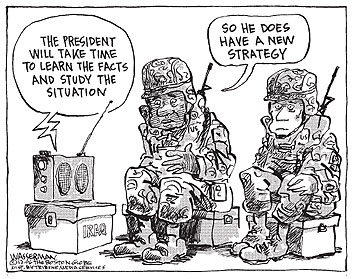 The new border would run from southwest to northeast roughly through Baghdad's airport. The new border would run from southwest to northeast roughly through Baghdad's airport.
The state to the northwest would include all 5 million Kurds and nearly all 5 million Sunni. It would include all of Baghdad and all the 2 million to 3 million urban and suburban Shi'a in its vicinity. It would also include all of the northern oil fields.
In contrast, the state to the southeast would be a purely Shi'ite state, including all the Shi'a of the rural south and Basra and all of the major Shi'ite holy sites. Naturally, it would also include the southern oil fields. But it would include no part of metropolitan Baghdad with the exception of access to the airport.
This southeastern state draws together the most-traditional elements of Iraq's Shi'ite community and none of Iraq's least-traditional, Baghdad-based Shi'a, to observe a mild version of sharia law. It would maintain cordial if not intimate relations with Iran, would become very rich from oil, and would function as a sort of Saudi-style guardian of the world's most important Shi'ite holy sites.
On the other hand, a polyglot state such as proposed for the northwest, centered in the major metropolitan area of Baghdad, would probably focus on industrializing its agricultural and refining sectors and becoming a trade center for the Middle East.
Living in today's Iraq are four major communities -- the southern Shi'a, the Sunni community, the Kurdish community and the metropolitan Shi'a most closely associated with al-Sadr.
The most traditional people in Iraq are probably the Shi'a who live south and east of Baghdad, perhaps reflecting their proximity to the Shi'ite holy cities of Najaf and Karbala. These are the people who arguably suffered the greatest hardship under Saddam. A homogeneous state of their own would seem to provide them the widest scope to adjust their government's jurisdiction over religious as well as civil life. It would also seem to provide them the greatest protection from any hostile coalition of less-traditional groups from the north.
For Iraq's Sunni community, the establishment of a northwestern state immediately solves two problems. Instead of being a 20 percent minority dominated by a Shi'ite population simmering with understandable resentment toward Sunni rule under Saddam, Iraq's Sunni would find themselves a 40 percent plurality. And instead of questionable access to oil in Shi'ite and Kurdish states under one possible three-way partition, the Sunni community would enjoy shared but uncompromised access to all the reserves of northwestern Iraq.
For Iraq's Kurdish community, a northwestern state would solve two big problems. Like the Sunni, Kurds would enjoy shared but uncompromised access to all the oil reserves near Kirkuk in the north. More important, however, is the fact that their state would be largely free from unreasonable threats from Turkey. It is true that Kurds would represent a 40 percent plurality of the new state. Sixty percent of that state, however, would be Arab, which simultaneously eliminates the danger of a purely Kurdish border state from the Turkish perspective -- and ensures political support from other Arab states.
Perhaps the most important reason to consider a two-state partition, however, derives from the needs of the urban Shi'a of Baghdad -- and perhaps even the ambitions of al-Sadr himself. A two-state partition arguably offers the best possible development solution for the inhabitants of places such as Sadr City. These Shi'a would comprise 20 percent of the population of the northern state. They would inevitably be the kingmakers of the northwestern state supporting Kurdish and Sunni political parties depending on the attention those parties paid to the development needs of Baghdad's urban poor. More immediately, they would no longer represent the vanguard -- and an easily attacked one, at that -- of a community of 15 million Shi'a threatening the livelihood of Iraq's Sunnis. As a minority of 2 million to 3 million Shi'a in the northwestern state, they would instead be a potential political ally for both Kurds and Sunnis, and might well play a role similar to the minority Shi'ite population of Syria. The reasons insurgents attack them today would be gone.
[click here to read entire editorial]
|

 The new border would run from southwest to northeast roughly through Baghdad's airport.
The new border would run from southwest to northeast roughly through Baghdad's airport.  Site Feed
Site Feed

0 Comments:
Post a Comment
<< Home